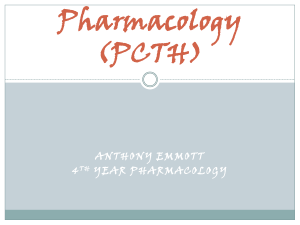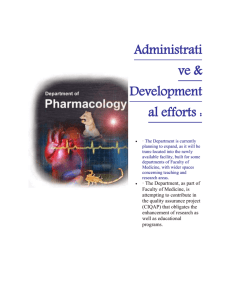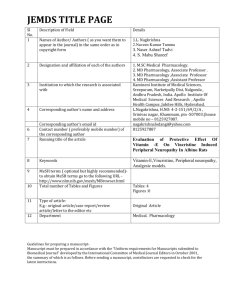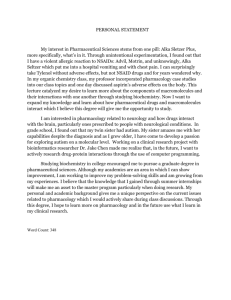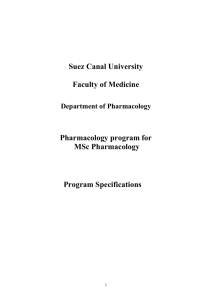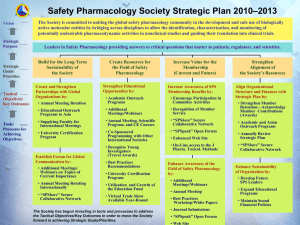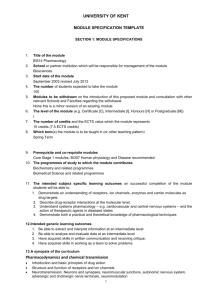MASTER OF SCIENCE IN PHARMACOLOGY
advertisement
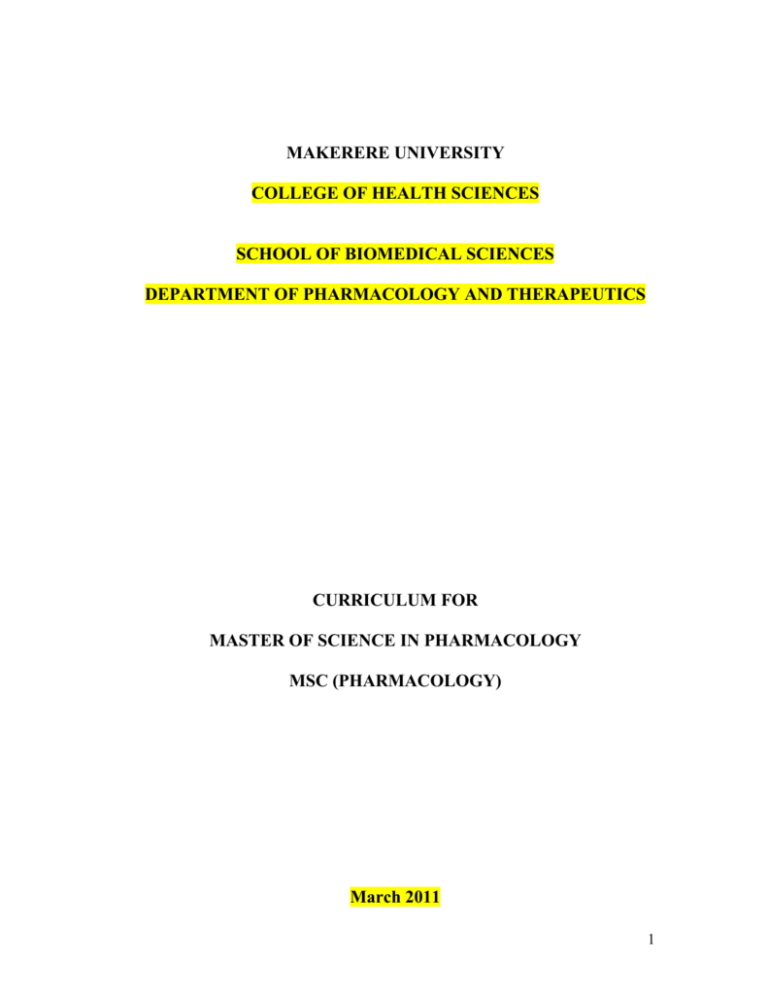
MAKERERE UNIVERSITY COLLEGE OF HEALTH SCIENCES SCHOOL OF BIOMEDICAL SCIENCES DEPARTMENT OF PHARMACOLOGY AND THERAPEUTICS CURRICULUM FOR MASTER OF SCIENCE IN PHARMACOLOGY MSC (PHARMACOLOGY) March 2011 1 1. Introduction The Master of Science course in Pharmacology is a two-year program. Course work is done in two semesters and one recess term during the first year. The second year is devoted to research and dissertation writing. Course work consists of lecturers, tutorials, seminars and prescribed pharmacological experiments. Students also participate in tutoring of undergraduate students under supervision. 2. 3. Program Justification i) Well-trained Pharmacologists are needed by Universities for teaching and research. The Undergraduate health professional programs cannot provide this expertise. ii) Pharmaceutical industries are on the increase in the country and the demand for Pharmacologists is on the rise. This course is one way of satisfying the demand for Research and Development officers in these industries. iii) Pharmacologists are on demand in medical schools, sports programs, and Ministry of Health training programmes for the paramedical courses. Capacity building for the present and the future requires developing this programme to ensure continuity and development. iv) Biomedical research related to drugs is emerging as a career, which has increased the demand for pharmacologist. This course will help to meet this demand. v) Local training of Pharmacologists is the only sure way of building capacity and self-reliance in this discipline because it is cheaper than training abroad. Goals and Objectives The objective of this course is to provide a sound knowledge of pharmacology and experimental techniques used in assessing pharmacological responses in biological systems to drugs. Candidates will also gain insight on how various chemicals affect cellular systems. At the end of the programme, candidates are expected to have achieved independence in planning, designing and executing pharmacological studies. 2 4. General Regulations The regulations and guidelines for Master’s Degrees of Makerere University shall be applicable. These will include: a) Guidelines for application, registration of research proposals supervision and examination of dissertations. b) Regulations on submission of progress reports and the final dissertation. c) Appointment of supervisors and examiners. 5. Admission Requirements The minimum entry requirements will be as follows: a) MBChB or its equivalent b) B.Pharm or its equivalent c) B.Sc. (Zoology) from a recognized University d) B.Sc. (Human Biology, Ethno botany,) from a recognized University e) BVM or is equivalent f) BDS or its equivalent g) B.Sc. (Pharmacology) from a recognized University h) B. Sc. (Nursing) from a recognized University i) B.Sc. (Biochemistry) from a recognized University For classified degrees, the minimum entry requirement shall be at least a Second class degree level. 6. Nature of the Curriculum The MSc. Pharmacology is a full time programme running for four semesters and one recess term. It will consist of course work and dissertation. The course work will be conducted by lectures, seminars, tutorials and demonstrations of prescribed experiments in Pharmacology. This will last two semesters and one recess term during which the student will rotate through the departments of Physiology, Biochemistry and Pharmacology & Therapeutics. Expertise from the departments of Anatomy and Physiology, Biochemistry, Medicine, and Psychiatry and Faculty of Veterinary Medicine will be called upon to assist in the teaching of relevant section of the course e.g. psychological testing techniques, personality, memory, development of the brain, etc. The student will spend the two semesters of the second year designing and carrying out a research project on the basis of which a dissertation will be written. 7. Assessment and examinations 7.1 Progressive Assessments and Examinations Since the programme of Master of Science in Pharmacology is semesterised, there will be progressive assessments and examinations in each semester. 3 Progressive assessments will be in the form of written papers, reports of pharmacological experiments and by participation in seminars and undergraduate teaching. The end of semester examinations will consist of: 7.2 Multiple Choice Questions Essay Questions Extended viva voce Assessment and Grading Each course will be assessed in two parts: Course work (Progressive Continuous Assessment), which should contribute 40% of the total marks. Examinations shall be graded out of a maximum of 60% of the total marks. That each Course should be graded out of a maximum of one hundred (100) marks and assigned appropriate letter grades and grade points as follows: Marks % Point 90-100 80-89 75-79 70-74 65-69 60-64 55-59 50-54 45-49 40-44 Below 40 Letter grade A+ A B+ B C+ C D+ D E E F Grade 5 5 4.5 4 3.5 3 2.5 2 1.5 1 0 Interpretation Exceptional Excellent Very good Good Fairly good Pass Marginal fail Clear fail Bad fail Qualified fail Qualified fail The minimum Pass mark in any course will be 60%. No credit should be awarded for any course in which a student fails. When a student has to re-sit a Course, he/she has to wait and re-sit that course when it is next offered. 7.3 Progress 7.3.1 Normal Progress To sit for the end of semester examination, a candidate must have a certificate of due performance. To progress from semester to semester and from first year to second year, a candidate must score a minimum grade point of 2.0 in each course. 4 7.3.2 Probational Progress A candidate who scores less than grade point 2.0 in a semester examination will re-take the course when next offered, but may proceed to the next year. 7.3.3 Discontinuation A candidate will be discontinued after obtaining: 3 consecutive probations in a core course, or 3 consecutive probations based on CPA or GPA 7.4 Dissertation The dissertation shall conform to the standing guidelines and regulations of the University on higher degrees. A candidate shall not be allowed to formally start on research work unless he/she has passed year one examinations. A candidate shall submit a research proposal to the Departmental Research Committee, which will be scored in the first semester of the second year. The proposal will also be approved by the Faculty Higher Degrees Committee. The candidate shall hand in three copies of dissertation three months before the end of Year II Semester II. To pass a dissertation, the candidate shall satisfy the examiners in written dissertation and viva voce. A candidate, who fails to satisfy examiners, shall resubmit a revised dissertation in accordance with the recommendations of the external and internal examiners. Failure to satisfy the panel of examiners in viva voce may lead to repeating the whole year or discontinuation. 8.0 Award of the Degree For the award of the degree, a candidate must pass all semester examinations and dissertation. The Degree of Master of Science in Pharmacology shall be awarded without classification. 9.0 Course Outline 9.1 Programme Course units The program Course shall be conducted on the credit unit basis. One credit unit shall be equivalent to one contact hour per week per semester or a series of 15 contact hours. One contact hour is equivalent to one hour of lecture/tutorial/seminars or two hours or practicals. 5 YEAR I SEMESTER 1 Code CEB 7101 PHA 7102 PHY 7103 PHA 7104 Course Title Epidemiology, Biostatistics and Research Methods Recent Advances in General Pharmacology, Neuropharmacology, Psychopharmacology, Toxicology and Clinical Trial Design Advanced Physiological Chemistry, Body fluids, Renal, Gastrointestinal, Cardiovascular and Respiratory Physiology Biochemical Basis of Pharmacokinetics and Drug Disposition LH TH PH CH CU 30 20 40 60 04 30 60 30 75 05 30 60 30 75 05 15 30 30 30 02 16 TH PH CH CU 45 45 75 05 60 30 75 05 TOTAL Code PHA 7201 PHY 7201 SEMESTER II Course Title LH Advances in Chemotherapy, Chemoprophylaxis, Cancer Therapy, Nutritional and Systemic 30 pharmacology. Advanced Endocrinology and Reproductive Physiology 30 PHY 7202 Advanced Neurophysiology 30 60 30 75 05 PHA 7202 Biochemical basis of Drug Action and Drug Interactions 15 30 - 30 02 17 TOTAL HMS 7301 PHA 7301 RECESS TERM Health Systems Management Advances in Experimental Pharmacology TOTAL 20 10 32 20 48 110 60 75 05 05 10 PHA 8101 PHA 8102 YEAR II Research proposal Writing Research Project (Dissertation) Total 10 10 30 10 100 120 75 75 05 05 10 6 Course details Year I Semester I 1. CEB 7101: Epidemiology, Biostatistics and Research Methods Course objectives By the end of the course, the student will be able to: 1. 2. 3. Describe and apply principles and methods of epidemiology Describe and apply principles and methods of biostatics Design a research proposal according to Makerere University guidelines Description of course Definition and application of Epidemiology, measuring health and disease association; prevention; evaluation of health services; accuracy; precision and bias; Descriptive statistics; probability distributions; Hypothesis testing; research question; problem statement; justification; objectives; study design; population and sampling; sample size; variables and data collection methods; Data management and analysis; quality control; ethics; budgeting and accounting. 2. PHA7102: Recent Advances in General Pharmacology, Neuropharmacology, Psychopharmacology, Toxicology and Clinical Trial Design Course Objectives: At the end of the course students should be able to: 1. Discuss recent advances in mechanisms of drug action, metabolism and disposition. 2. Describe the autonomic and central nervous receptors, their transmitters and associated pathological lesions. 3. Discuss the drug development process and design clinical trials. 4. Describe drug toxicology, Toxikinetics and Toxidynamics. 5. Discuss the drugs used in mental illness and their mechanism of action. 7 Course Outline Advances in General Pharmacology: Pharmacokinetics, Pharmacokinetic characteristics of Drugs, Pharmacogenetics. Peripheral, Autonomic, and Central Nervous transmission Advances in Toxicology; General effects of Drugs and other Chemicals, Characteristics of adverse reactions to drugs and Poisons Drug Discovery and Development; Pre-clinical Studies, Clinical Trials: designing, ethics, meta-analysis and Drug registration Central Neurotransmitters and their Pathway: Doperminergic, Cholinergic, 5HT, Noradrenaline Pathways, The Basal Ganglia, Reticular formation and other structures significant in the Pathway, Morphine receptors and Related Compound Syndromes associated with transmission defects and their management; Schizophrenia, Parkinson’s disease, Depression, Alzheimer’s disease, Mania and Hypomania, Guiles de la Tourette’s Syndrome, Anxiety states, Huntington’s disease. Anticonvulsants and Anxiolytics: Benzodiazipines, Barbiturates, Newer drugs in this group like Baspirone and others Natural products including Traditional medicines .Suggested readings: 3. Goodman & Gilman’s Pharmacological Basis of Therapeutics Rang & Dale, Ritter Moore, Pharmacology Bertram G. Katzug, Basics Clinical Pharmacology Lippincott’s illustrated Reviews Pharmacology by Myak, Harvey & Champe PHY 7103: Advanced physiological chemistry, Body fluids, Renal, Gastrointestinal, Cardiovascular and Respiratory Physiology Course Objectives: At the end of this course students should be able to: 1. Discuss recent advances in physiological chemistry and body fluids. 2. Discuss recent advances in renal, gastrointestinal, cardiovascular and respiratory physiology 3. Discuss the physiological basis of drug therapy. Detailed Course Outline: Advances in cell function; transport across cell membrane, electrolyte distribution, nerve impulse generation, electrical and mechanical properties of nerve and muscle, homeostatic mechanisms. Body fluids; blood, lymph, cerebral spinal fluid, immunochemistry, 8 Blood: composition, cells function, indices, bile formation, hemostasis coagulation, factors and process blood, blood grouping, transfusion, blood composition and formation of coagulation, metabolism are covered including anaemia hemoglobinopathies, transfusion reactions/disorders and jaundice bile pigments. Normal cardiovascular function and its regulation Advanced physiology of the renal system Control of respiration and pathophysiological adjustments to hypoxia. Advances in Gastrointestinal physiology and factors affecting Nutrient absorption . Suggested Readings: Physiology Guyton Physiology by Ganong 4. PHA 7104: Biochemical basis of Pharmacokinetics and Drug disposition Course objectives At the end of the course students should be able to: 1. Describe in more detail the sites, principles and consequences of drug biotransformation and drug disposition. 2. Discuss the drug biotransformation pathways, drug metabolizing enzyme systems and enzyme polymorphisms. 3. Discuss abnormal pathways of drug biotransformation and their clinical significance. Detailed Course Outline: Introduction to Drug Metabolism Enzyme Kinetics Components of the Mixed Function Oxidase and Drug Metabolism Oxidative reactions other than the mixed Function Oxidase Reductive Drug Metabolism Conjugation Reactions Drug Biotransformation in special conditions; Neonates, Elderly and Pregnancy Inherited Metabolic disorders Genetic Variations in Drug Metabolism 9 Year I Semester II 5. PHA 7201: Advances in Chemotherapy, Chemoprophylaxis, Therapy, Nutritional and Systemic pharmacology. Cancer Course Objectives At the end of the course students should be able to: 1. Discuss the principles of chemotherapy, classification and mechanisms of action of antimicrobial agents and anticancer agents. 2. Discuss the mechanisms of resistance and resistance transfer. 3. Discuss advances in the treatment of diseases of main body systems. 4. Discuss the treatment, prevention of infections and infestations in medical and veterinary practice. 5. Discuss the use of nutraceuticals in disease treatment and prevention 1. Detailed Course Outline History of Chemotherapy, Classification of Antibacterial agents and Antiseptics, Mechanism of Action of Antibacterial Agents. Development of Resistance to Antimicrobial Agents, transfer of Resistance and mechanism of resistance Antifungal Agents; Mechanism of action and associated side effects. Antiviral agents; Mechanism of Action, recent developments in treatment of HIV. Anticancer Agents Drugs used in the Cardiovascular diseases Advances in Renal Pharmacology Recent advances in Endocrine Pharmacology Drugs acting on the Gastrointestinal System Respiratory Pharmacology Vitamins and vitaminoids and other nutraceuticals Suggested readings: Goodman & Gilman’s Pharmacological Basis of Therapeutics Rang & Dale, Ritter Moore, Pharmacology Bertram G. Katzug, Basics Clinical Pharmacology Lippincott’s illustrated Reviews Pharmacology by Myak, Harvey & Champe 10 6. PHY 7201: Advanced Endocrinology And Reproductive Physiology Objectives. By the end of this course, the students will be able to: Explain the general principles hormone action. Discuss the functions and control of endocrine glands. Assess endocrine glands of the productive system. Content Principles of hormones action;; specific functions of each endocrine gland its control relations to other endocrine glands; male and female reproductive functions plus the hormones involved; immunology; physiology of pregnancy and the new born; asses endocrine glands. PHY 7202: Advanced Neurophysiology Objectives. By the end of this course, the students will be able to: Describe the histology and functions of excitable tissue. Discuss the origin and function of the central nervous system (CNS). Conduct neurological experiments to assess the CNS Content Physiology of excitable tissues; functions of sensory and motor cortex; posture, movement and equilibrium;; automatic nervous system; special senses; sexual behavior; learning and memory; assessment of nervous function and localization of lesions. 7. PHA 7202: Biochemical basis of Drug Action and Drug Interactions Course objectives: At the end of the course students should be able to: 1. Explain the cell structure and cellular processes as drug targets 2. Explain the principles of drug action including the role of second messengers 3. Discuss the mechanisms of drug toxicity. 4. Explain the science of drug interactions. Detailed Course Outline: Cell Structure The cell membrane: Structure, ion channels and the action potential Modes of Drug Action The receptor concept and receptor structures The second messengers Biochemical Basis of Drug Interactions Toxic Drug Metabolites and their effects on Cellular Structure The role of Antioxidants 11 8. Year I: Recess Term. 9. HMS 7301: Health Systems Management By the end of this course, students will be able to: 1. 2. Outline the health policy and system Lead the process of preparing strategic and operational plans for their organizations. Work with and supervise other health workers. Undertake financial management. Collect and utilize information for management decision-making. 3. 4. 5. Contents: Unit1: Concepts in health policy, planning and management. Unit 2: Management of personnel in a health care organization. Unit 3: Introduction to concepts in health economics and financial management. Unit 4: Management of materials (drugs, medical supplies, medical equipment, transport and health infrastructure. Unit 5: Information systems and basic performance indicators. Unit 6: Medico-legal aspects of health care management and regulation. PHA 7301: Advances in Experimental Pharmacology 1. 2. 3. 4. . Course objectives At the end of the course students should be able to: Design and conduct pharmacology experiments. Analyze data generated from tissue and animal studies Establish animal models of common disease Handle common pharmacological equipments Course Outline Agonist: Experimental determination and definition. Antagonist: Experimental determination and definition. Log-dose response curves: generation and interpretation. Dissociation constants. Intrinsic activity and efficacy: determination and derivation. PD2 and PAx: values and determination. Transmural stimulation. Canulation of vessels and trachea. Pitched animal preparations. 12 Toxicity testing: Acute, sub-acute and chronic testing techniques and evaluation of results. Contact hypersensitivity and skin irritancy testing techniques. Allergic reactions and their classifications. Extraction and isolation oaf pharmacologically active principles from natural products. Statistical evaluation of pharmacological experiments. Suggested Readings: Experimental Pharmacology by Gupta Year II: 1. PHA 8101: Research proposal Writing Course Objectives At the end of the course students must be able to: 1. Analyze situations and identify research questions. 2. Formulate research hypothesis and test them 3. Present a proposal for critical appraisal. Content outline: Research; definition, types and importance The research proposal; components and importance Literature review Sources of research data Methods of research; sample size and data analysis. 2. PHA 8102: Research Project (Dissertation) Course objectives At the end of the course students should be able to: 1. Conduct a research project 2. Manage data generated from a research project. 3. Summarize and report data generated from a pharmacological of clinical study. Content outline: Implementation of research proposal: desgning data collection tools, Planning for data collection Data Management and analysis Data presentation Report writing. APPENDIX 13 Resources: Physical Facilities The program will be conducted with resources from the departments of Pharmacology and Therapeutics, Physiology and Biochemistry. The three departments have wellestablished laboratories for postgraduate training. At the department of Pharmacology and Therapeutics, there are postgraduate rooms to which are attached laboratories. There is also a seminar room, which accommodates a well-stocked library. Personnel The existing members of the participating departments named above will conduct the program. Specialists from the department of Medicine will be called upon to teaching in the program. Notable here are topics in Renal and Respiratory physiology and cancer chemotherapy. The core staff to teach the program Department of Pharmacology: 1. Prof. W.W. Anokbonggo MD., MSc., PhD 2. 3. Dr. C. Obua MD. MSc.PhD 4. Dr. Paul Waako MBChB, MSc., PhD Professor Senior Lecturer Senior Lecturer Department of Biochemistry: 1. 2. 3. 4. 5. Dr. Haumba Mr. Enyaru Mr. Vuzi Mr. Wamutu Ms. Baigana BSc., MSc., PhD BSc., MSc. BSc., MSc. BSc., MSc. BSc., MSc. Lecturer Lecturer Lecturer Lecturer Lecturer Department of Physiology: 1. 2. 3. 4. Dr. J.H. Okullo MBChB, MSc. Dr. J.N. Nakiboneka Mazzi MBChB, MSc. Dr. M. Ebuk MBChB, MSc. Dr. J.N. Kasolo MBChB, MSc. Senior Lecturer Lecturer Lecturer Lecturer Department of Medicine: 1. 2. 3. 4. Dr. E. Mbidde Dr. E. Kigonya Dr. M. Okot-Nwang Dr. Jackson Oryem MBChB, Mmed. MBChB, Mmed. MBChB, Mmed. MBChB, Mmed. Senior Consultant Physician Senior Consultant Physician Senior Consultant Physician Senior Consultant Physician 14 Department of Psychiatry: Dr. Musisi Segane MBChB, Mmed. Senior Consultant Physician BUDGET: Source of Funding: Tuition fee (Ugandans): 1,500,000= P x 7 students Total income 10,500,000= EXPENDITURE: Particulars Qty Rate a) Teaching b) Administration c) Examination Covered by staff salary by Makerere ” ” Office tea and entertainment by Makerere Amount (Shs) 300,000= Material supplies/office by Makerere University: 1. Photocopying paper 2. Toner for photocopier 3. Ruled paper 4. Manila papers 5. Markers 6. Assorted envelops 7. Chalk 8. Correction fluid 9. Ball pens 10. Computer paper 11. Printer cartridge 12. Laboratory reagents Total Expenditure 20 reams 6No. 20 reams 12 dozens 10 dozens 7,500 150,000 7,500 12,000 10,000 7 boxes 4 boxes 8 pkts 8 boxes 6 No. 4,000 4,000 6,000 50,000 150,000 150,000= 900,000= 150,000= 144,000= 100,000= 40,000= 28,000= 16,000= 48,000= 400,000= 900,000= 7,324,000= 10,500,000= 15

